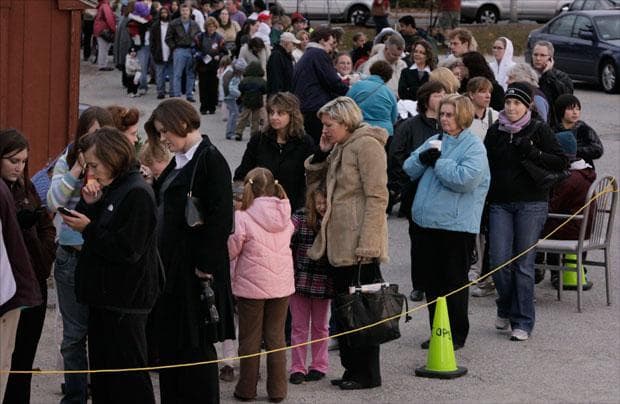Advertisement
FAQ: Swine Flu Facts And Figures
ResumeIf you were hoping swine flu was on the decline in Massachusetts — sorry. State health officials say the H1N1 virus is so widespread there's now more flu in the state than at any other time in recorded history. Yet some doctors say swine flu is actually peaking or slowing. To make sense of these conflicting claims, here are some swine flu questions and answers.

Just how rampant is swine flu in Massachusetts?
Normally this time of year, about one percent of all health care visits would be due to the flu. But right now the state is showing that seven percent of all trips to hospitals, doctors, clinics and other medical facilities are flu-related. That's double the peak of the state's swine flu outbreak last spring, and it's nearly double the peak of a typical winter flu season.
Some doctors and emergency rooms recently reported a plateau in swine flu cases, so aren't we getting a mixed message?
In a word, yes. Some Massachusetts hospitals say patients coming to the E.R. with flu-like symptoms are leveling off. Newton-Wellesley Hospital's emergency department, for example, had 93 swine flu cases in the first nine days of November, but only 78 cases in the second nine days of the month. And some college health clinics, including at Boston University and MIT, say their volume of sick students is slowing. Nationally, the American College Health Association reported this week that new cases of flu among college students have started to drop, also suggesting a peak.
How do we reconcile that with the state saying flu is at a historic high and H1N1 probably hasn't peaked?
This could be a case of so-called reporting bias. To explain: since swine flu is getting so much publicity, people are extra-worried about becoming sick. So even if they only have a mild flu, they go to a doctor because they're scared. Then all those visits get reported to the state, even though in a typical flu season many sick people wouldn't have bothered to call a doctor.
"Maybe someone who has the sniffles and a fever would normally just stay home and manage it. But when they're being told there's a 'novel strain,' then there's more uncertainty and anxiety about a potentially severe illness. So they call or visit the doctor — and things that used to fly under the radar are now flying to the attention of people who record such events. And that 'reporting bias' looks like a surge...but that's because historically we haven't been that attentive [to the volume of minor flu cases]."
-- Dr. David Diamond, associate medical director, MIT
Do most people with swine flu get well on their own, without visiting a doctor or taking prescription drugs?
Yes. Most people with the swine flu can — and do — get better by resting, drinking fluids, eating well and staying home until their fever is gone.
Do we really know that all the flu-like illness in Massachusetts is the H1N1 virus?
Yes, according to state officials. All the virus samples they've tested so far have been swine flu, and seasonal flu doesn't usually arrive until December. So the state Department of Public Health says all the flu that's here now is H1N1.
How hard are schools being hit by swine flu?
A few Massachusetts schools have seen flu-related student absentee rates of more than 40 percent so far this fall, and even close to 50 percent. When a school shuts down due to the flu, it should stay closed for 5 to 7 days, because that covers the flu's incubation period and average length of symptoms. As a result, the state prefers that schools don't close because closures are so disruptive to families and communities.
"In some cases, the children are staying home not because they themselves are sick, but because parent have decided that they prefer to have their child home to avoid having them get sick."
— Dr. Lauren Smith, state medical director
Are swine flu vaccine supplies increasing in the state?
So far, Massachusetts has received about a million doses of the H1N1 vaccine. It expects to get another half-million doses by the end of November, and its full order of 3.5 million doses by late January. In the next several weeks, more doses will go to local boards of health, which should then begin holding large vaccination clinics. But the vaccine is still arriving slowly and unpredictably.
"Saying 'for sure' and 'vaccine allotment' in the same sentence is hard, because we can't have any guarantee about what we're going to be allotted until each day, when we look to see what we've actually been allotted."
— Dr. Lauren Smith, state medical director
How plentiful is the state's supply of seasonal flu vaccine?
The state Department of Public Health has already given away most of its seasonal flu vaccine, even though it ordered significantly more doses than usual this year. So it's going to be harder these days to find the seasonal vaccine, although some private doctors should still have some.
Is swine flu turning out to be as big a problem as health officials worried it might be?
That depends on how you define "big problem." If you define it by the number of people affected, then it is a fairly big deal because the virus is circulating widely, causing disruption for communities, families, workplaces and schools.
"But if you define it based on what people were really scared about — in terms of really high rates of fatalities, that sort of thing — then obviously, thankfully, we're not in that place."
— Dr. Lauren Smith, state medical director
How can I find a vaccination site near me?
The state has a telephone service that provides vaccine location information; just dial 2-1-1. And you can search for places in your area to get vaccinated at the web site flu.masspro.org.
This program aired on November 20, 2009.
